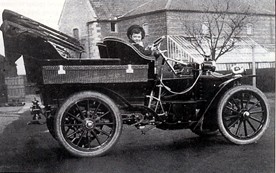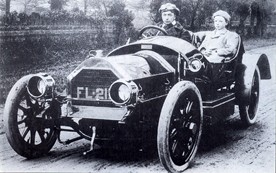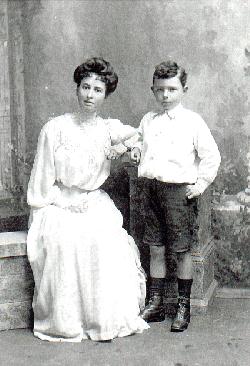The reputation of Thomas William Mays
has been somewhat overshadowed by the celebrity of his son Raymond, the motor racing pioneer, but his influence over him and his work for the town should not be forgotten.
T W Mays was not only a prominent businessman and Justice of the Peace but was also for several years chairman of Bourne Urban District Council. He was patriotic and civic minded and in June 1898, he was gazetted a First Lieutenant and became second-in-command of the newly formed H Company, the 2nd Volunteer Battalion, the Lincolnshire Regiment, based in Bourne under the command of Captain Cecil Bell, a local solicitor. He was proud to be in uniform and was subsequently promoted captain, a title he kept until the day he died. The unit undertook training in the use of weapons, carrying out rifle practice on the ranges at Bourne, Edenham and Grantham, and also attended weekend camps under canvas at Skegness. It also provided soldiers for the Boer War of 1899-1902 and again in the Great War of 1914-18. In 1916, when manpower was needed in other areas, members of the corps were invited to train as firemen because the regular brigade had been depleted through the loss of men who had been called to the colours and there were fears that fires might be caused by air raids. There is no evidence that any damage did result from enemy bombing but a German Zeppelin airship was seen in the vicinity soon afterwards and blackout precautions during the hours of darkness were imposed in the area early in 1916. Thomas Mays' first public office was to succeed his father on the board of the National School and then in 1894, he was elected a member of the first parish council for Bourne and when the urban council was formed in 1899, he also became a member of that and remained so until 1923, serving as chairman for four successive years from 1904 to 1908, a record that has been unequalled in the town since. Mays became an ex-officio magistrate and was later appointed a permanent Justice of the Peace and subsequently a member of the advisory committee for appointing magistrates and the magistrates' representative on the trustees of the Bourne United Charities. However, sport was one of his main preoccupation and he was adept at billiards, tennis and swimming, and was also a local pioneer in cycling, being one of the first in the town to purchase a bone-shaker from a shop in Peterborough which he promptly rode home to Bourne. He then began to take an interest in motor cars that no doubt fired the young Raymond's lifelong passion for motor racing. Mays and Dr John Gilpin of Brook Lodge were the owners of the first two cars in Bourne and from the age of five or six the boy accompanied his father on business trips by car and later to the hill climbs and speed trials in which his father competed. Mays and Dr Gilpin were also frequent competitors in local motoring events and the two of them were successful in the Lincolnshire Automobile Club speed trials held at Grimsthorpe Park in March 1910 when Mr Mays won the Newsum Challenge Cup for the third time and therefore the trophy became his property. He was driving a De Dion and Dr Gilpin took second place with his Gregoire.
Religion played an important part in his life as a member of the Congregational Church where his father and grandfather had been instrumental in helping found the Sunday School where he was for many years a teacher and later honorary secretary, eventually becoming a trustee, succeeding his father who had been one of the original members of the board. He was also generous to the church and regularly paid for an annual winter treat for the Sunday School children. Thomas Mays also had a fine baritone voice and accepted many invitations to appear at charitable concerts and musical entertainments in the town when he sang popular Victorian drawing room ballads, one of his favourites being Excelsior, then enjoying a wide public appeal. Politically, he was a Liberal and was president of the Liberal Club in Bourne from its inception. He was also a prominent freemason and member of the Hereward Lodge in Bourne where he commanded so much respect that fellow members mounted a guard of honour at his funeral when he was interred in the town cemetery.
The Mays family home was Eastgate House, which dates back to the 18th century. An elegant Regency brick facade was added to the front of the original stone building, which had its own well in the kitchen, and the date 1796 can be seen above the back door in the yard. The adjacent maltings buildings, orchard and greenhouse were sold by Mays in 1933 to the English Racing Automobile Company founded by his son Raymond and it was here that the pre-war E R A and post war B R M racing cars were built but Mays did not live to see the new works completed. He died on 21st November 1934 at the age of 78 after a long period of illness. Fifteen months before, he fell and broke his thigh. His mobility was seriously impaired and he was forced to use a bath chair but never fully recovered. The Stamford Mercury recorded his passing with an effusive tribute saying: "He was well known in Bourne and Stamford, and throughout the country, for the firm of which he was head was one of the principal of its kind in Britain. A true gentleman, he was deeply sensible of the high esteem in which he was held by the residents of Bourne and was always willing to assist in any venture aimed to benefit the town. He was born in Bourne and had lived there all his life. During the war [of 1914-18], the firm of which deceased was managing director were the appointed purchasers and distributors of wool for a large area, including the whole of Lincolnshire. Another side of the business, the manufacture of chemical manures, was developed under the supervision of Mr Mays who was chairman and managing director of the company which was formed to exploit it." The funeral service was held at the Congregational Church in Bourne and conducted by the Rev Denis Brown who gave a striking eulogy to Mr Mays before a packed congregation. "A man's character", he said, "is usually known by the things he does and says. I pass over the great services which he has rendered in this town and the splendid unselfish service he has rendered to this church and this Sunday School - secretary and worker for many years and a great friend of the Sunday school children. I speak of him as I knew him, and no matter how a man may hide his true character from his fellow man, it is always revealed on a prolonged bed of sickness. I only knew him as a sick man. I found him keen, but considerate; straight - as straight as a die - but kind; frank - he never wrapped anything up - but gentle. So I was never surprised when I heard him spoken of as a gentleman. He had those qualities which make a gentleman and an Englishman and I have no higher praise than that. He was a gentleman, and a gentleman in every true sense of the term."
Thomas Mays had married Annie Beatrice Shilcock on Wednesday 1st June 1898, one
of the six daughters of John Baxter Shilcock, landlord of the Nag's Head in the Market Place at
Bourne. The ceremony was held at the Abbey Church when the bridesmaids were
Annie's sisters, Fanny, Ida and Effie Shilcock, and the groom's two sisters,
Sissie and Muriel Mays. Raymond was their only child. Annie was a striking beauty in her youth and often attended race meetings when Raymond was competing. She looked after the house for fifty years and continued these domestic duties after her husband died, acting as hostess for Raymond's many business friends and famous personalities from the world of motor sport and show business, and although handicapped by arthritis in later years, she still presided over the house from her bedroom where she died in 1973 at the age of 97.
REVISED MARCH 2014 See
also George Henry Mays Raymond Mays & Mays and Sons Go to: Main Index Villages Index |
|||||||||||



